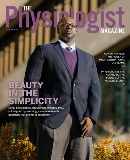Research Rewards
How to get a clinical perspective of your research.

Each issue, we ask a trainee member to pose their career questions to an established investigator and mentor. Here, Elena Kozlova, a graduate student researcher and neuroscience PhD candidate at the University of California, Riverside, asks Babbette LaMarca, PhD, professor and interim chair of the Department of Pharmacology & Toxicology at the University of Mississippi Medical Center, about her research and career challenges.
Q: What is your favorite aspect of your research?
A: I enjoy analyzing data from the lab and putting things into a clinical perspective. I enjoy thinking “Why does it matter if we answer this question; will it have a clinical relevance?” My research is flexible in scope
in that we answer questions with cell culture and whole animal models of preeclampsia compared to normal pregnancy and then we think about what impact this could have on a clinical population. In partnership with the field of obstetrics and gynecology,
we are able to apply our laboratory science to patient therapies. We currently have four active clinical studies and one clinical trial.
Q: As a physiologist, how does your training give you a unique perspective on how you approach research questions? How is this different from other researchers in your department or institution?
A: I try to bring a clinical perspective into our research. In addition to being a physiologist working with a rodent model of preeclampsia, I also train maternal-fetal medicine fellows in the research portion of their fellowship training.
This allows me to interact with clinicians and learn their new findings, and it broadens my perspective of research questions I can pursue in the lab. I feel that this allows us to pursue more of a translational angle to our research. So I encourage young
people to collaborate with clinicians to at least get their perspective on a clinically relevant question and what affects their patients most and incorporate that into your research.
Q: What are some challenges you encountered in your career path and how did you respond?
A: Having a family can be a challenge for men or women during their careers. The key is to do your homework when the children are sleeping. My husband and I laugh because there is about 10 years of TV show jokes we don’t get because
we were raising babies, putting them to bed and getting them off to school. In between, we were on our laptops at night or at 5 a.m.
I encourage you to look for someone that will either understand that these are the hours young faculty members keep or find someone that is career driven too. My husband has his career, and I have mine, but we share in each other’s progression, listen to one another about stressful days and, in turn, share in the raising of our family. This is one of the most important choices you will make. After you make it, support each other in your growth as professionals in respective fields.
Other challenges in this career come from not being able to obtain funding. Everyone has grants that are “not discussed” or scored but unfunded. Keep that in mind as this eventually will happen to you as well. Find a mentor in your area, a co-investigator or someone you can trust to read your grants and try to understand your questions and methods and who will give you advice. Maybe you will develop a relationship so that you can support each other on grants and expand your techniques and innovation.
Keep your head high and listen to reviewers’ criticisms and try to address some of them in the
resubmission. Try not to be stubborn about addressing questions in your area of research that may not be clear to others. This is one way that you can apply others’ advice and make your work better based on reviewers’ comments.
Got a career question you'd like to submit? Email it to tphysmag@physiology.org. We may use it in an upcoming Mentoring Q&A.
This article was originally published in the May 2022 issue of The Physiologist Magazine.
The Physiologist Magazine
Read the Latest Issue
Don’t miss out on the latest topics in science and research.
View the Issue Archive
Catch up on all the issues of The Physiologist Magazine.
Contact Us
For questions, comments or to share your story ideas, email us or call 301.634.7314.


